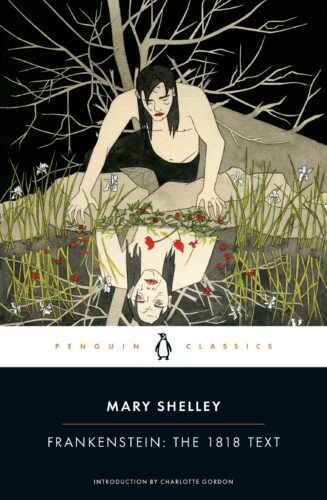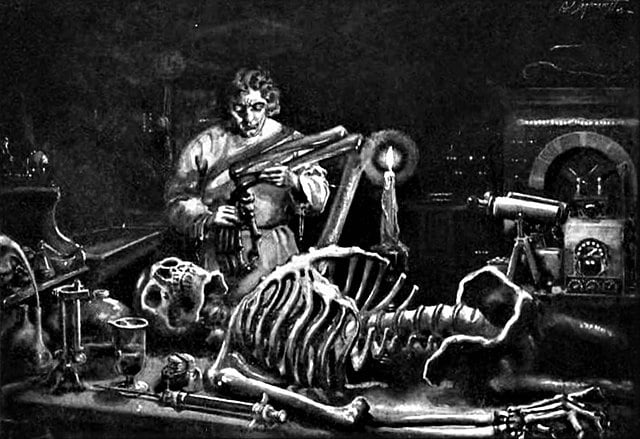 Made a Monster?
Made a Monster?
Author: Mary Shelley
Dr. Victor Frankenstein is a young, ambitious man who has used science to unravel the deepest, most impenetrable mysteries of life and death. His own ambition has destroyed him, and the walking testament to his hubris has become vengeful and half-crazed from rejection. Thus begins Mary Shelley’s tale of a man who did not respect the bounds of nature and God and now must contend with the horror of his own creation.
Most of us hear the word Frankenstein and we think of mad scientists, sizzling lightning bolts, shouts of “it’s alive,” evil laughter echoing throughout haunted castles, and a green hued creature with bolts in its neck and a flattened head stalking the countryside, searching either for revenge or an undead bride (depending on your late-night movie fetish). The original book that started it all is something entirely different, both more and less sensational.
Victor Frankenstein is no mad scientist. Instead, he is a man who seeks knowledge quietly and under the pall of night, ashamed and yet driven by curiosity and an idea that has morphed into obsession. These fever dream nights of grave robbing and sewing are more hinted than seen, although the gruesome shamefulness of it all is evident. There is no lightening storm. The creation is more mistake than deliberate action. Frankenstein, now older, wiser, and grieving, never reveals how he created life from so much death. There are no jubilant shouts of “it’s alive.” Instead, Frankenstein is afraid and repulsed, running away from his creation.
The creation – never named, only referred to as the monster – is on its own. Its journey is one of pain and suffering, a creature without a creator, one that experiences nothing positive. The creature goes from longing for connection, to bitterness, to vengeance, to one ultimate request of his recalcitrant maker. The creature wants another of his species, a bride, so that he may not be alone. For this, he agrees to banishment, to rejection, to all manner of evil and toil. But Frankenstein regrets what he has created, and despite the sense of gnawing guilt and occasional flashes of sympathy, the doctor remains intent on destroying his creation.
The original story has little in common with the lurid movies that have become iconic. The monster here is the doctor, the creator. The creature, flawed as he may be, shows that monstrousness evolves from withheld nurture, not nature. It’s a sad story, one that points out issues of responsibility, especially between creator and created, yet it is all together too short.
Shelley’s book begins as an epistle told from an intrepid Artic explorer, another young man with ideas. Out here in the bleak nothingness the narrator sees a huge man on dogsled escaping into the shifting glaciers. Behind him comes a bedraggled Frankenstein, who slowly reveals all. And the narrator, another translator, sends pieces of that tale back to his sister (although it is doubtful that he really learns from Frankenstein’s mistakes.) This distancing of the storytellers from the final audience is one of the few detriments of the story. For something so emotional, the distance is unwise; the filters of multiple narrators, each with their own prospective, blunt the horrors and anguish of a story that is ultimately one of life and death.
The action, the implications, the emotions are full throttle, albeit sadly obscured behind multiple narrators, but the biggest issue is that Frankenstein is such a quick read. With so much going on, with so many complex emotions and ideas, with the idea of monstrousness and inhumanness so cleverly turned on its head, it’s a pity that this tale is more novella than novel, more short story than story. It’s still fantastic, and worthy of its classic status, but every time I read it, I leave wanting more. This re-read was no different.
– Frances Carden
Follow my reviews on Twitter at: https://twitter.com/xombie_mistress
Follow my reviews on Facebook at: https://www.facebook.com/FrancesReviews
- Book Vs Movie: The Shining - April 6, 2020
- Thankful For Great Cozy Mysteries - December 13, 2019
- Cozy Mysteries for a Perfect Fall - October 20, 2019



